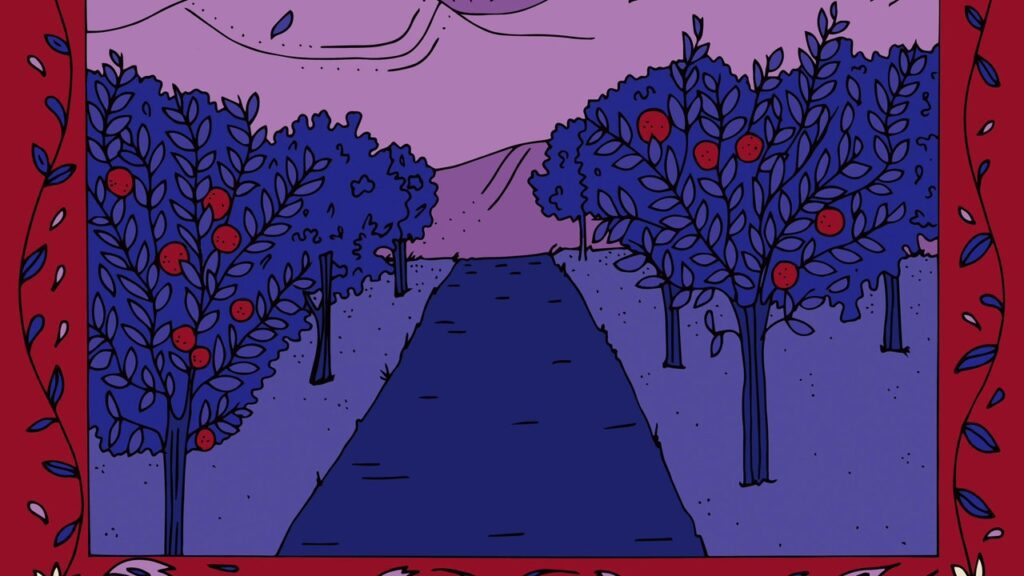
On a first spin, Brooklyn trio Scree’s debut, Jasmine on a Night in July, scans as a promising little electric guitar record. Ryan El-Solh’s subtle, trebly strings touch almost every corner, whether opening the fractured waltz “Beautiful Days” with stunted chords that curl like question marks or stepping out for a solo that, on the title track, suggests late jazz great Jim Hall winking back through the cosmos. At its best, El-Solh’s tone suggests the distorted gleam of an unpolished pearl; it also evokes that sense of distant longing the Germans call Weltschmerz, sweetness twinkling ever so slightly through the dusk. Chet Atkins and Omar Khorshid, Bill Frisell and Mary Halvorson: These players—each with individual, distinct senses of sound and timing—seem essential to El-Solh’s personal pantheon. He’s not there yet, but his playing on Jasmine makes you remember the name, search for the quizzical solo album, maybe bookmark the Bandcamp.
Listen again and again, and something deeper soon emerges through these nine tracks: Scree are a spellbinding and selfless new trio, with a chemistry that belies debut status. Double bassist Carmen Rothwell and drummer Jason Burger—ringers with their own songs and extensive folk-rock credits, respectively—work in conversation with El-Solh, whose instrument is simply the most vocal and pronounced here. It is telling that the 20-second collage that serves as the album’s invocation, assembled by producer Ari Chersky from Scree’s improvisational scree, is all long swirling tones and pointillist percussion, no guitar. When El-Solh’s arid Morricone melody spills suddenly through that din, the creation myth is clear: This wouldn’t exist without all of them, which is exactly what makes Jasmine on a Night in July much more than a promising little electric guitar record.
The key to this instrumental integration is Scree’s insistence in always slipping off the beat, as though every meter has a steep and slightly curving face, as hard to mount as El Cap. Rothwell, Burger, and El-Solh are collectively the rhythm section and a rhythm-less section, the haze emanating from the implied beat. “Fatigue” is the feat here. Lap-steel sighs, bittersweet piano plinks, and bowed bass that feels like both a shrug and a hug unspool beneath El-Solh’s rambling lead. Soon, Burger’s drums give momentary structure to these overlapping moans, the melody tightening around his rumble like a slowly contracting muscle. Just as quickly, it all relaxes, oozing back over the drums like a group sigh. Somewhere between ECM’s famous austerity and Windham Hill’s endless vibes, “Fatigue” packs a life of possibility and doubt into 145 seconds. What is the difference between sitting still or being pushed along, between absolute torpor and ceaseless anxiety? “Fatigue” never finds the answer.
As El-Solh penned the pieces that shape Jasmine on a Night in July, he was reading the work of Mahmoud Darwish, a Palestinian poet whose childhood home in Galilee was upended by Israeli forces. Though Darwish was an eventual political prisoner and enduring “resistance poet,” his work often mined a sentimental ambiguity, longing for a better past as it squinted at the wobbly future. “I am only my steps, and you are both my compass and my chasm,” he once wrote, loading a universe of equivocation into a single sentence. Scree thrive in those emotional interstices. The brief piano-and-percussion beauty “Wind and Sand” feels like an agitated daydream, the distant organ suggesting background unease you cannot escape. The organ is as playful as a carnival song during “Fresh Bread,” Burger’s drums almost peppy. But there is a lingering sadness, too, especially in El-Solh’s pinched electric notes and the way Burger drifts out of and races back into the meter. This is the memory of sustenance, of sated happiness, not the thing itself.
Almost four years ago, Scree debuted with Live at the Owl, a short set capturing a 2018 night in a small Brooklyn room. Listening back, the parts sound mostly the same—El-Solh’s guitar, suspended somewhere between the Mediterranean Sea and Frisell’s basement; Rothwell’s upright, lumbering and inquisitive like a grazing Quarter Horse; Burger’s drums, slowing and speeding the beat like he’s navigating hairpin turns. What’s not there, though, is the sense of synchronous feeling that makes their debut so enchanting, as if all three are singing the same wordless story in uncanny harmony. Not unlike Tortoise and Labradford in the mid ’90s, Jasmine on a Night in July feels like the proper introduction to a significant new piece of the American instrumental rock landscape, familiar threads woven into fabric that feels novel.
